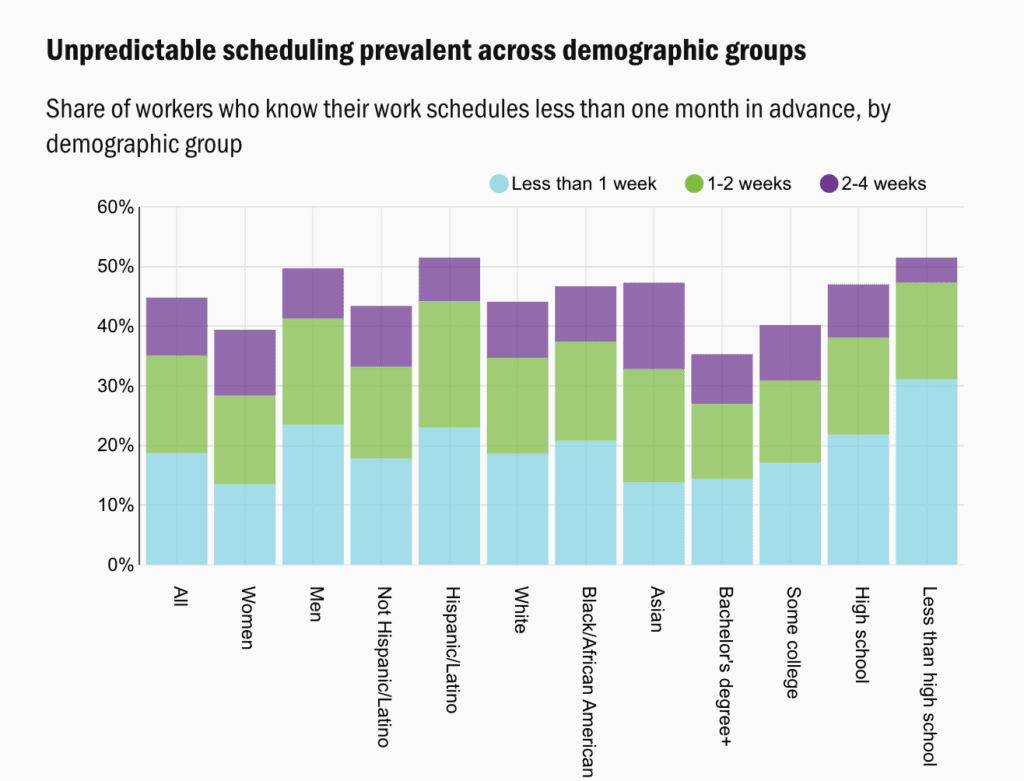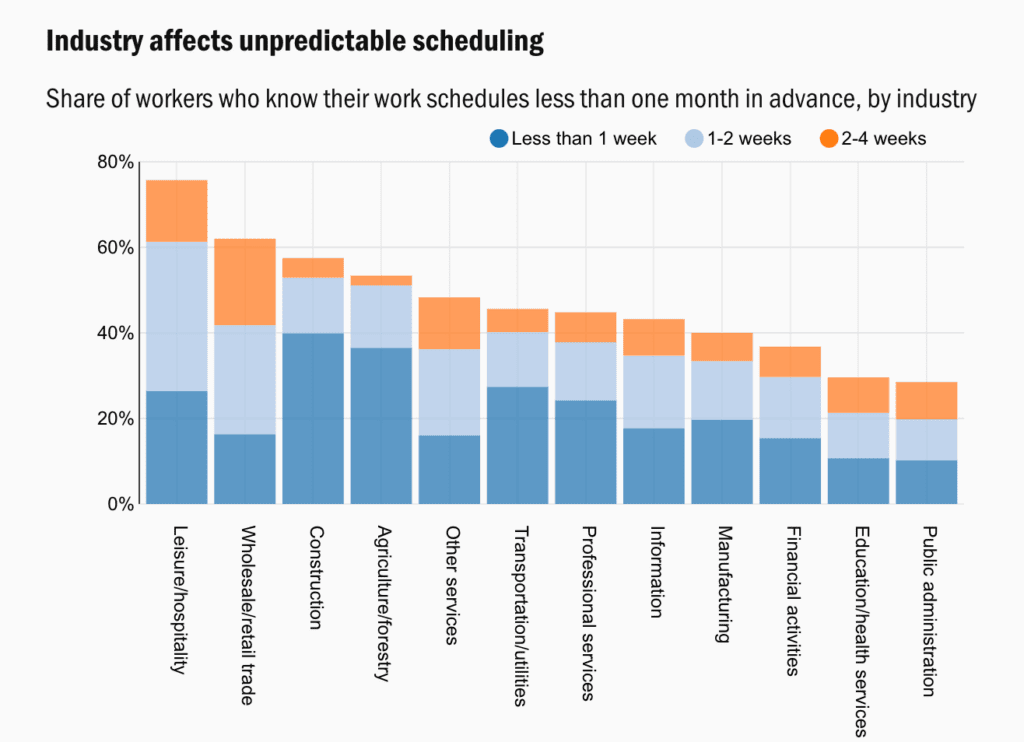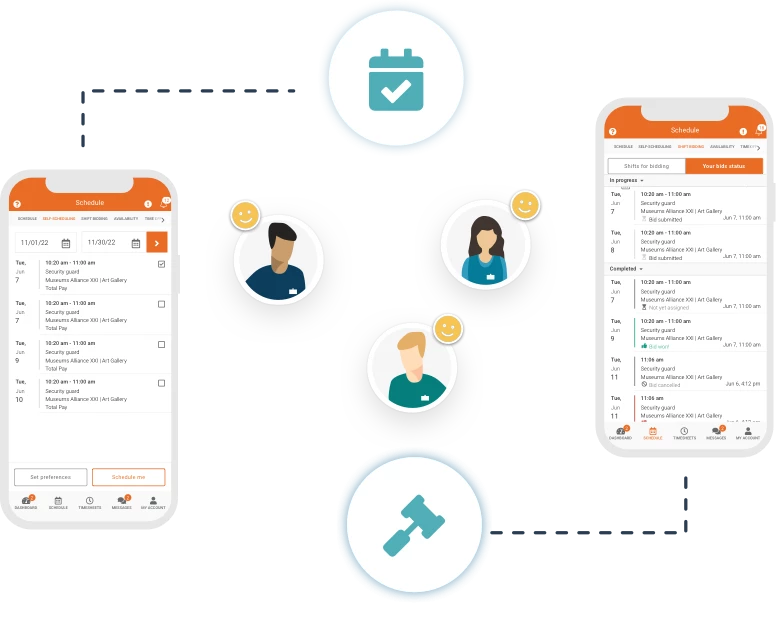Fair scheduling is a contentious topic on which many employees have strong feelings. Erratic scheduling practices subject many shift workers, centering them around demand. In the busy hospitality industry, employee scheduling can be challenging due to changing customer needs and seasonal fluctuations. It requires careful balancing.
However, amidst this chaos, schedulers often overlook a crucial issue – fairness in scheduling. The unpredictability of scheduling not only affects the lives of employees but also impacts their well-being and job satisfaction. It’s also not the best way to control labor costs, guest experience, or profitability.
Unpredictable Scheduling is Unfair Scheduling
Unpredictable scheduling or “Just-in-time scheduling” is a scheduling practice that matches worker supply to customer demand. Last-minute changes, irregular hours, and inadequate notice characterize it, wreaking havoc on the lives of hospitality workers. Imagine not knowing your work schedule until a day or two before the shift, making it nearly impossible to plan personal commitments, childcare, or even a second job. This uncertainty leads to financial insecurity, stress, and a lack of work-life balance, ultimately impacting employee retention and morale.
Why does the Hospitality Industry still rely on Unpredictable Scheduling?
When employers view labor as an expense to manage rather than a source of productivity and competitive advantage, they more commonly create unpredictable schedules. Despite its adverse effects, the hospitality industry continues to rely on unpredictable scheduling for several reasons. Firstly, the nature of the industry itself, with its dynamic demand patterns and seasonal fluctuations, makes rigid scheduling challenging. Additionally, some employers may prioritize cost-saving measures and operational flexibility over the well-being of their employees, viewing them as expendable resources rather than valuable assets.
How prevalent is unpredictive scheduling?
According to statistics from the American Time Use Survey Leave and Job Flexibilities Module, two in every five wage and salary workers over the age of 15 know their schedules less than one month in advance. Almost one-fifth of people know their plans less than a week in advance. Men have less scheduling notice than women, owing to gender inequalities in employment in industries or vocations where short notice is typical.
The industry has a significant impact in predicting whether a worker would be subject to just-in-time scheduling. Three out of every four workers in the leisure and hospitality business receive their schedules less than one month in advance, with the majority receiving less than two weeks’ notice.
Hospitality Industry has the most unpredictable scheduling, based on the stats reported by the Beauru of Labour Statistics. For industries such as retail and hospitality, just-in-time scheduling has become a norm that employees have become used to.
Fair Work Week Laws: A Step Towards Equity
Recognizing the need to address this issue, several jurisdictions have introduced fair work week laws aimed at promoting more equitable scheduling practices. These laws typically require employers to provide advance notice of schedules, offer compensation for last-minute changes, and limit mandatory overtime. By providing workers with greater predictability and stability in their schedules, these laws aim to improve their quality of life and enhance workplace satisfaction.
Implementing Fair Employee Scheduling for Hospitality Workers
Implementing fair scheduling practices in the hospitality industry requires a multifaceted approach that balances the needs of both employers and employees. Here are some strategies that can help achieve this goal:
- Utilize Scheduling Software: Invest in employee scheduling software that allows for efficient demand forecasting, employee input, and automated scheduling. These tools can help create optimal schedules, while ensuring that employees receive fair and predictable schedules. Celayix has all of these features, along with an AI Schedule Assistant that can check your schedule to ensure it is fair and unbiased.
- Provide Adequate Notice: Strive to provide employees with schedules at least two weeks in advance to allow for better planning and work-life balance.
- Offer Flexible Scheduling Options: Introduce flexible scheduling options such as split shifts, compressed workweeks, and self-scheduling systems that empower employees to choose shifts that align with their preferences and commitments.
- Implement Fair Work Week Policies: Adhere to fair work week laws and go beyond compliance by offering additional benefits such as premium pay for last-minute changes and guaranteed minimum hours for part-time employees.
- Promote Open Communication: Foster a culture of open communication where employees feel comfortable expressing their scheduling needs and concerns. Regular feedback sessions can help identify areas for improvement and ensure that scheduling practices remain fair and transparent.
Fair scheduling is a sound business practice that leads to greater employee satisfaction, productivity, and retention. In the hospitality industry, where success hinges on the quality of customer service, ensuring fair and predictable scheduling is essential for maintaining a motivated and engaged workforce. By embracing equitable scheduling practices and prioritizing the well-being of employees, hospitality businesses can create a more sustainable and thriving work environment for all.









